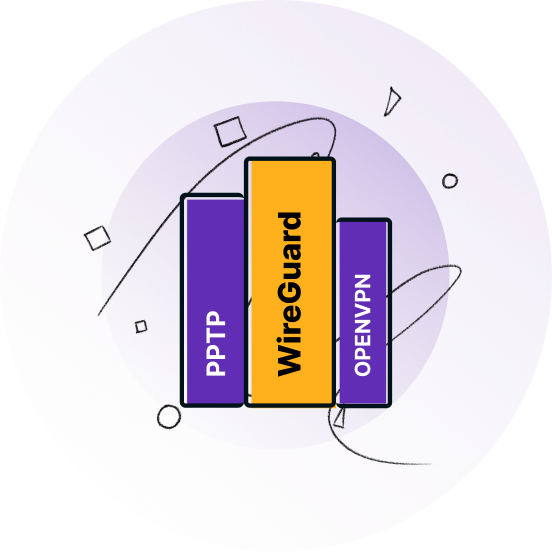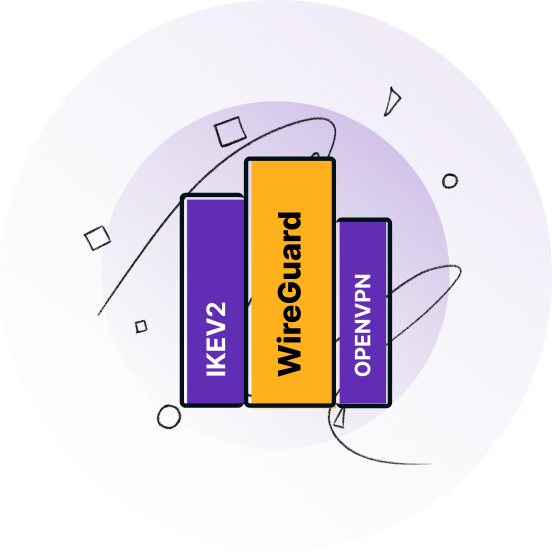VPN Protocols
VPN Protocols are the set of instructions and processes between a VPN server and the VPN client to make a stable and secure connection. In essence, a VPN protocol is a combination of encryption standards and transmission protocols.

What is a VPN Protocol?
VPN protocols play a vital role, ensuring both online safety and speed. Your choice of protocol determines if your VPN prioritizes speed or security. These protocols act as tunnels for your online traffic, with varying levels of security and streaming performance. Different protocols cater to mobile devices or Wi-Fi routers. Some excel in internet protocol security. Picking the right protocol is key for an optimal browsing experience.


Which VPN Protocol Should You Use?
Choosing the right VPN protocols can be challenging yet essential. Two types exist: one prioritizes security, the other focuses on streaming speed. Balancing both isn’t possible. Security-strong protocols sacrifice browsing speed, as they narrow the ‘tunnel’ with encryption. Speed-focused protocols skip security for wider tunnels, enabling smoother data flow and better streaming speeds.
How Do VPN Protocols Work?
VPN protocols have versatile roles, centered on authentication and encryption. Authentication validates your device’s link to the VPN server, while encryption secures data from prying eyes. Protocol choice affects both security and speed. Different encryption and authentication techniques provide varied levels of protection. Protocols also vary in error handling, affecting connection reliability and stability.

Protocols Comparison
The following chart provides a thorough comparison of different VPN protocols:
| VPN Protocol | Speed | Encryption | Streaming | Stability | P2P | Available in PureVPN app |
|---|---|---|---|---|---|---|
| OpenVPN | Good | Very Good | Good | Very Good | Good | |
| IPSec/IKEv2 | Very Good | Good | Good | Excellent | Good | |
| WireGuard* | Excellent | Very Good | Excellent | Very Good | Excellent | |
| SSTP | Fair | Good | Fair | Fair | Fair | |
| L2TP/IPSec | Fair | Good | Poor | Good | Poor | |
| PPTP | Very Good | Poor | Good | Good | Good |
Which VPN Protocol is the Fastest?
WireGuard is considered the fastest among all the VPN protocols. If you wish to stream and download P2P files faster on the network, make sure to use WireGuard after signing in to PureVPN. Besides WireGuard, L2TP and IKEv2 are also considered fast, while OpenVPN and SSTP are slower than other VPN protocols.
Winner: WireGuard


Which VPN Protocol is the Most Secure?
When it comes to security and encryption, both WireGuard and OpenVPN can keep internet users safe from prying eyes. Moreover, IKEv2 and L2TP are also secure VPN protocols because they encrypt your data twice. All in all, WireGuard is considered the most secure VPN protocol while offering the highest level of encryption and using numerous digital certificates for authentication.
Winner: WireGuard
Which VPN Protocol is the Best for P2P File Sharing?
If you want to download files on the internet without lagging, use a protocol that offers both high-end security and speed. While PPTP is best-suited for downloading, it lacks security as it uses 128-bit encryption. L2TP and IKEv2 use 256-bit encryption through IPSec. But, L2TP doesn’t offer high internet speeds. WireGuard provides both high speed and top security, so consider switching to WireGuard protocol when you are using VPNs solely for downloading files.
Winner: WireGuard

The best VPN Protocol
Selecting the best VPN protocol is a personalized decision and not a one-size-fits-all solution. The right choice depends on your specific online activities and requirements.
The Most Stable VPN Protocol
IKEv2/IPSec is regarded as the most stable VPN protocol because it ensures a robust connection while offering the flexibility to switch between networks without compromising security.
The Best VPN Protocol for Gaming
For optimal gaming experience, the WireGuard protocol offered by PureVPN is the top choice. With WireGuard, you get the fastest VPN speeds available, all while maintaining robust security and stability.
The Easiest VPN Protocol to Set Up
PPTP is simple to set up and compatible with many devices, but due to its outdated nature and security concerns, we do not recommend it. Instead,you should consider modern alternatives like WireGuard or IKEv2/IPsec for improved security.
VPN Protocols Explained
PureVPN selects the best VPN protocol on your behalf for a secure and speedy connection. We also give our users the convenience of choosing the VPN protocol if you want to.
WireGuard
WireGuard is the newest VPN protocol on the block. Meant to be a replacement of IPSec, it is allegedly lighter and faster. Furthermore, it is open source, which means a reduced likelihood of security vulnerabilities. However, the protocol is still under development and lags behind in terms of cross-platform compatibility.
L2TP – Layer 2 Tunneling Protocol
Since it does not provide strong authentication, L2TP is used with IPSec for security. Though it may conflict with some firewalls, it is a great alternative to the OpenVPN protocol because it supports all modern platforms, and can get around ISP/network limitations.
SSTP – Secure Socket Tunneling Protocol
Owned by Microsoft, SSTP is only available for Windows, FreeBSD, and Linux and cannot be audited. Regardless, it is one of the most secure VPN protocols and has the ability to bypass most firewalls.
OpenVPN – Open-Source Protocol
With fast performance and top-grade encryption, OpenVPN is the protocol of choice. This open-source solution is configurable and runs on any port. As a result, you can get past most ISP/network restrictions and firewalls.
IKEv2 – Internet Key Exchange
Based on the IPSec framework, IKEv2 is the most recent and advanced VPN protocol. Jointly developed by Cisco and Microsoft, it is fast, stable, secure, and very easy to setup. However, since it is new, there is a lack of support for older platforms.
IPSec – Internet Protocol Security
IPSec is a set of protocols used for various purposes, including securing VPNs. It is usually paired with VPN protocols like IKEv2 and L2TP to provide data confidentiality (encryption) and authentication, but can be utilized as a standalone VPN protocol as well.
Other VPN Protocols
These VPN protocols are discussed for information purposes only.
SSL/TLS – Secure Socket Layer
SSL and its successor TLS are the most commonly used cryptographic protocols today. Every time you visit an HTTPS website, SSL or TLS secures your connection with the server. It is used in VPN protocols like OpenVPN for encryption, but is not a VPN protocol by itself.
PPTP – Point-to-Point Tunneling Protocol
Due to its basic encryption and low security, PPTP offers a much faster connection. It supports most platforms and is easy to setup. That said, it is not recommended unless security is completely unessential.
SoftEther
SoftEther is fairly new in comparison to other VPN protocols (excluding Wireguard). It’s quickly gained popularity because it’s very secure, stable, and fast. The protocol works with most operating systems (including Solaris and FreeBSD) and even has functionalities that OpenVPN doesn’t offer, like GUI Management and RPC over HTTPS, to name a few.

